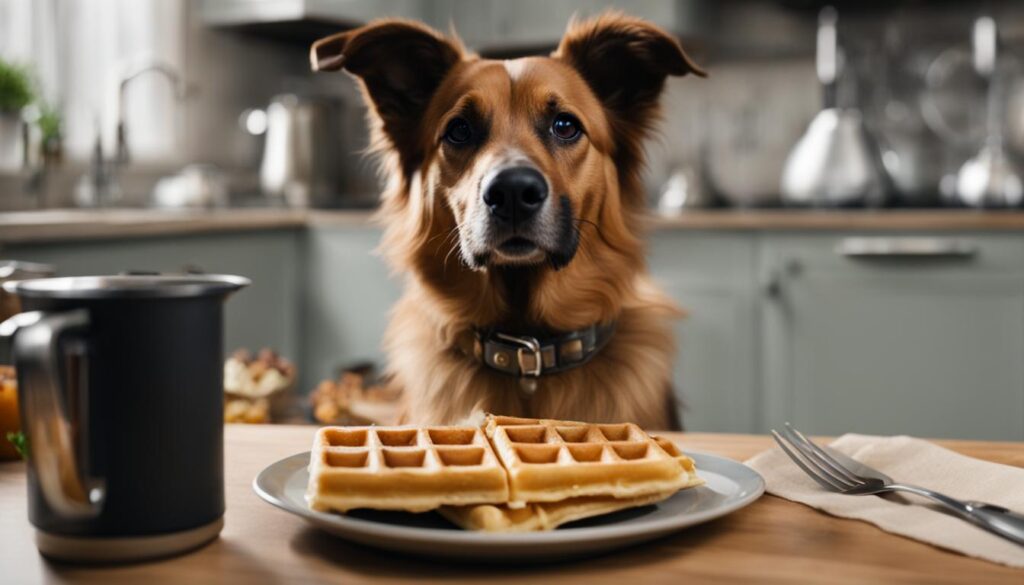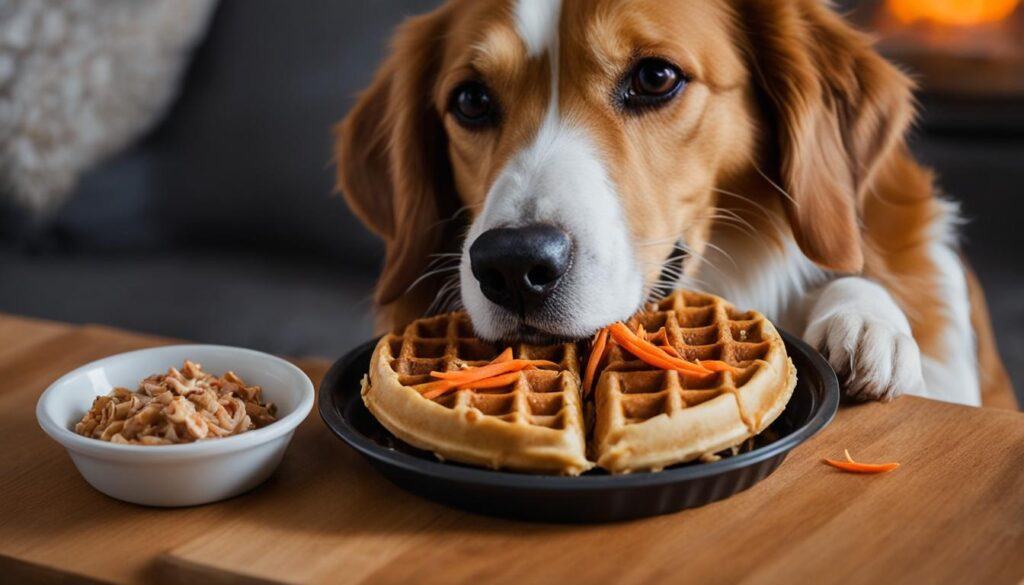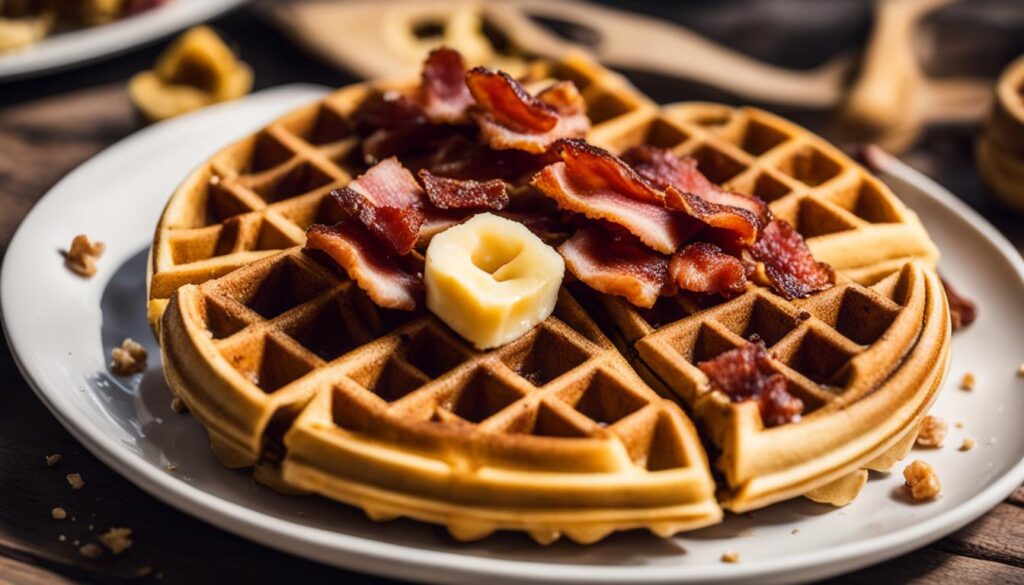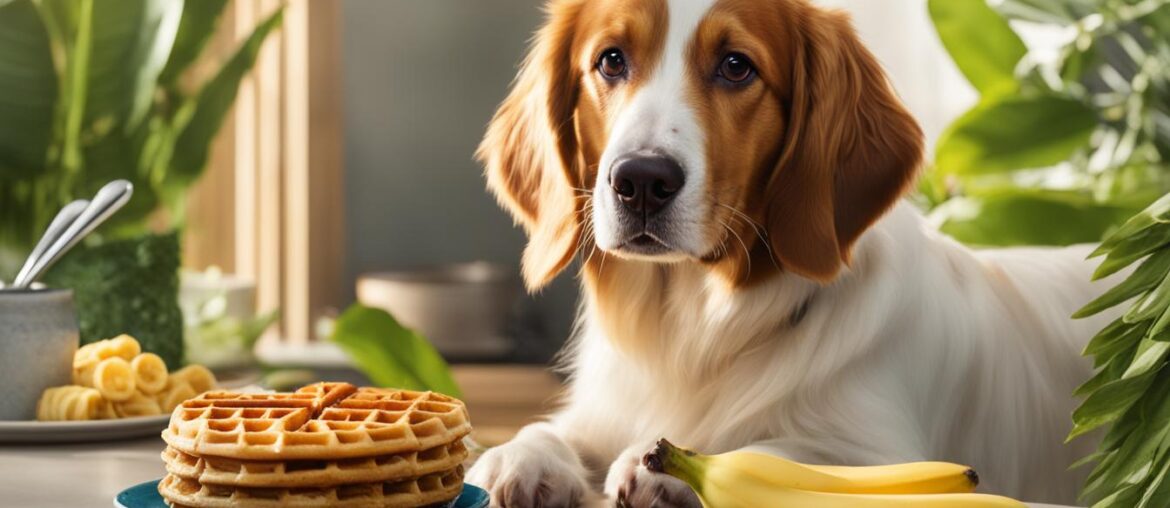When it comes to feeding waffles to your furry companion, there are a few important things to keep in mind for their safety and well-being. While plain homemade waffles made with ingredients like flour, baking soda, eggs, and vanilla extract are generally safe for dogs in small amounts, it’s important to avoid waffles with harmful ingredients like sugar, syrup, artificial sweeteners, chocolate chips, or xylitol.
Regular consumption of waffles can contribute to obesity and related health issues in dogs, so they should be treated as an occasional treat rather than a regular part of their diet. Butter, syrup, and other high-fat toppings should also be avoided. It’s crucial to exercise portion control and consult with a veterinarian about any concerns or specific dietary needs for your dog.
Key Takeaways:
- Plain homemade waffles made with safe ingredients can be given to dogs in moderation.
- Avoid waffles with harmful ingredients like sugar, syrup, artificial sweeteners, and chocolate chips.
- Regular consumption of waffles can contribute to obesity and related health issues in dogs.
- Exercise portion control when offering waffles to dogs.
- Consult with a veterinarian for personalized guidance on your dog’s diet.
Can Dogs Eat Plain Homemade Waffles?
When it comes to plain homemade waffles, dogs can enjoy them in moderation. Waffles made with safe ingredients like flour, baking soda, eggs, and vanilla extract are generally safe for dogs to consume in small amounts, making them a tasty treat option. However, it’s important to remember that waffles should not be a regular part of a dog’s diet and should be offered as an occasional indulgence.
Plain homemade waffles can be a delicious and enjoyable snack for your furry companion, but it’s crucial to prioritize their health and well-being. While these waffles contain safe ingredients, it’s essential to avoid harmful toppings such as butter, syrup, and other high-fat ingredients that can contribute to obesity and digestive issues.
When introducing waffles to your dog, it’s crucial to exercise portion control and offer them in moderation. Waffles should not replace a balanced and nutritious diet tailored to your dog’s specific dietary needs. Consulting with a veterinarian is always recommended to ensure you’re providing the best care and guidance for your furry friend.
It’s important to note that not all dogs may tolerate waffles well, even if they contain safe ingredients. Each dog is different, and their dietary needs and tolerances may vary. Always monitor your dog’s well-being and consult with a veterinarian if you have any concerns.
If you’re not comfortable making homemade waffles for your dog, there are also store-bought options available. However, it’s essential to read the ingredients carefully and choose waffle treats specifically made for dogs, avoiding any harmful substances that may be present in human-grade waffles.
In conclusion, plain homemade waffles can be given to dogs as an occasional treat, but it’s necessary to prioritize their overall health and well-being. Safe ingredients like flour, baking soda, eggs, and vanilla extract can be used to create dog-friendly waffles. However, it’s always best to consult with a veterinarian regarding portion control and any specific dietary needs your dog may have.
Harmful Ingredients in Waffles for Dogs

While plain homemade waffles made with safe ingredients can be enjoyed by dogs, it’s essential to be aware of the harmful ingredients that can be toxic to our furry friends. Dogs should avoid waffles containing sugar, syrup, artificial sweeteners, and chocolate chips.
Sugar, when consumed in excess, can lead to various health issues in dogs, including obesity, dental problems, and even diabetes. Syrup, especially those high in sugar content, can contribute to weight gain and disrupt blood sugar levels.
Artificial sweeteners, such as xylitol, commonly found in sugar-free waffles, can be particularly dangerous for dogs. Xylitol can cause a rapid release of insulin, leading to a dangerous drop in blood sugar levels that can be life-threatening.
Chocolate chips, a popular inclusion in waffles, contain theobromine, a substance that is toxic to dogs. Ingesting chocolate chips can result in symptoms such as vomiting, diarrhea, rapid breathing, and, in severe cases, seizures.
Precautions for Feeding Waffles to Dogs

When it comes to feeding waffles to our furry friends, precautions must be taken to ensure their safety and well-being. Here are some essential measures to consider:
- Avoid Harmful Toppings:
When giving waffles to dogs, it is important to steer clear of harmful toppings such as butter, syrup, and other high-fat ingredients. These toppings can contribute to obesity and digestive issues in dogs, which can have long-term health effects. Instead, opt for dog-safe waffle toppings like unsweetened applesauce or a small amount of plain yogurt. These alternatives provide a flavorful addition to the waffles without jeopardizing your dog’s health.
- Exercise Portion Control:
Portion control is crucial when offering waffles to dogs. While a small piece of waffle can be a delightful treat, it is important not to overindulge our furry companions. Dogs should consume waffles in moderation as part of a balanced and nutritious diet. Too much waffle consumption can lead to obesity and related health issues. It’s always best to consult with a veterinarian to determine the appropriate portion size for your dog based on their specific needs and dietary requirements.
- Consult with a Veterinarian:
Every dog is unique, and their dietary needs may vary. Before introducing waffles into your dog’s diet, it is advisable to consult with a veterinarian. They can provide personalized guidance based on your dog’s age, breed, weight, and any existing health conditions. A veterinarian can also recommend suitable dog-safe waffle recipes or store-bought alternatives that meet your dog’s nutritional needs while ensuring their overall well-being.
Remember, waffles should be an occasional treat and not a regular part of your dog’s diet. Prioritize a balanced and nutritious diet for your furry friend, and use caution when introducing any new food item, including waffles. When in doubt, always seek professional advice from a veterinarian to ensure the optimal health of your beloved pet.
| Precautions for Feeding Waffles to Dogs | Benefits |
|---|---|
| Avoid harmful toppings | – Ensure a healthier treat option – Reduce the risk of obesity and digestive issues |
| Exercise portion control | – Maintain a healthy weight – Prevent obesity-related health problems |
| Consult with a veterinarian | – Receive personalized guidance – Ensure specific dietary needs are met |
Impact of Waffles on a Dog’s Health

Feeding waffles to dogs on a regular basis can have a significant impact on their health. While plain homemade waffles made with safe ingredients can be consumed by dogs in moderation, regular consumption of waffles can contribute to obesity and related health issues. Dogs that are overweight are at a higher risk of joint problems and conditions such as arthritis, which can significantly impact their mobility and quality of life.
Obesity in dogs has been linked to a range of health risks, including an increased risk of heart disease, diabetes, and other serious conditions. The high-fat toppings commonly associated with waffles, such as butter and syrup, can further contribute to weight gain and digestive issues.
It’s important for dog owners to prioritize a balanced and nutritious diet for their pets to maintain their overall health and well-being. While an occasional treat like a plain homemade waffle may be enjoyed by some dogs, it’s crucial to exercise caution and moderation to prevent negative health consequences.
Joint Issues in Overweight Dogs
Joints, such as hips and knees, can be particularly affected by excess weight in dogs. The added strain on these joints from carrying excess weight can lead to chronic pain, stiffness, and decreased mobility. Over time, this can contribute to the development of joint conditions such as arthritis, which can significantly impact a dog’s quality of life.
Health Risks of Obesity in Dogs
Obesity in dogs has been associated with a range of health risks and complications. Dogs that are overweight or obese are at a higher risk of developing conditions such as:
- Heart disease
- Diabetes
- High blood pressure
- Respiratory problems
- Decreased immune function
- Increased risk of certain types of cancer
These health risks can significantly impact a dog’s well-being and longevity. As responsible pet owners, it’s important to be aware of the potential consequences of regular waffle consumption and take steps to ensure our furry friends maintain a healthy weight.
| Health Risks | Impact on Dogs |
|---|---|
| Heart Disease | Increased risk of cardiovascular problems and decreased heart function |
| Diabetes | Elevated blood sugar levels and insulin resistance |
| High Blood Pressure | Increased strain on the cardiovascular system |
| Respiratory Problems | Difficulty breathing and decreased exercise tolerance |
| Decreased Immune Function | Greater susceptibility to infections and slower healing |
| Increased Cancer Risk | Higher likelihood of developing certain types of cancer |
By understanding the impact of waffles on a dog’s health and taking steps to prevent obesity and related health issues, we can ensure that our beloved pets lead long, healthy, and happy lives.
Portion Control and Consultation with a Veterinarian

When it comes to feeding waffles to dogs, portion control is key. It’s important to offer the right amount of waffles based on your dog’s size, weight, and overall health. Starting with small portions is advisable, so you can monitor your dog’s weight and overall well-being to ensure they maintain a healthy weight.
Consulting with a veterinarian is essential when it comes to your dog’s diet. They can provide personalized guidance based on your dog’s specific dietary needs. A veterinarian can offer advice on safe portion sizes for dogs, taking into consideration their breed, age, activity level, and health conditions. They can also help you create a balanced and nutritious diet plan tailored to your dog’s individual requirements.
It’s important to remember that waffles should be given to dogs as an occasional treat, not as a substitute for their regular meals. While dogs may enjoy the taste of waffles, it’s crucial to prioritize their overall nutritional needs. A veterinarian can ensure that your dog’s diet remains healthy and well-rounded, taking into account their specific dietary requirements.
Personalized Portion Control and Diet Guidance
Every dog has unique dietary needs, and consulting with a veterinarian ensures that your dog’s diet is tailored to their specific requirements. A veterinarian can assess your dog’s current weight and body condition, considering factors such as metabolism and activity level, to determine the appropriate portion sizes for meals and treats.
In addition to portion control, a veterinarian can provide guidance on choosing appropriate food options for your dog. They can recommend high-quality pet food brands that meet your dog’s nutritional needs and offer advice on ingredients to avoid. This helps ensure that your dog’s diet remains safe and balanced.
Remember, a veterinarian is your best source of personalized guidance when it comes to your dog’s diet. They have the expertise and knowledge to provide tailored recommendations and monitor your dog’s health and weight over time. By working closely with a veterinarian, you can ensure that your dog receives the proper portion sizes and a well-balanced diet for optimal health and well-being.
| Benefits of Portion Control and Consultation with a Veterinarian | Importance |
|---|---|
| Ensures appropriate portion sizes for your dog | Prevents overfeeding and obesity |
| Addresses dog-specific dietary needs | Customizes diet based on breed, age, and health conditions |
| Provides personalized guidance on a balanced and nutritious diet | Ensures optimal nutrition for your dog’s overall well-being |
| Monitors your dog’s weight and health over time | Allows for adjustments to diet based on your dog’s changing needs |
Homemade Dog Waffle Recipe

If you’re looking to treat your dog to a homemade waffle, I’ve got a dog-friendly recipe that you can try. This recipe uses safe and healthy ingredients that are suitable for your furry friend.
Here’s what you’ll need for this homemade dog waffle recipe:
- Oat flour or brown rice flour
- Unsweetened applesauce
- Eggs
- Coconut oil
To prepare the waffle batter, simply mix the oat flour or brown rice flour with unsweetened applesauce in a bowl. Add the eggs and coconut oil, and continue to mix until well combined.
Once the batter is ready, preheat your waffle maker according to the manufacturer’s instructions. Pour the batter onto the waffle maker and cook until golden brown. The cooking time may vary, so keep an eye on the waffle and adjust accordingly.
Once the waffle is cooked, remove it from the waffle maker and let it cool before serving it to your pup. Remember to always check with your veterinarian about any specific dietary needs or restrictions your dog may have before trying this homemade dog waffle recipe.
Providing your dog with homemade treats can be a great way to bond and show them your love. Just make sure to prioritize their health and well-being by using safe ingredients and consulting with a veterinarian for personalized advice.
Store-Bought Dog Waffle Treats

If you prefer not to make homemade dog waffles, there are store-bought options available. However, it’s important to check the ingredients of these treats to ensure they don’t contain any harmful substances.
When selecting store-bought dog waffle treats, it’s essential to prioritize your furry friend’s health and well-being. Take the time to carefully read and analyze the list of ingredients. Look for treats that use safe and healthy ingredients, such as whole grains, natural sweeteners (in limited amounts), and real fruits or vegetables.
Avoid treats that contain harmful ingredients such as artificial flavors, colors, or preservatives. These can be detrimental to your dog’s health and may lead to allergies, digestive issues, or other health problems.
Checking Ingredients for Dog Treats
When checking the ingredients of store-bought dog waffle treats, be mindful of the following:
- Avoid treats that contain excessive amounts of sugar or artificial sweeteners. These can lead to weight gain, diabetes, and other health issues.
- Steer clear of treats that contain harmful additives or preservatives, such as BHA, BHT, or propylene glycol.
- Be cautious with treats that contain common allergens like wheat, soy, or corn, especially if your dog has known allergies or sensitivities.
- If your dog has specific dietary needs or restrictions, consult with your veterinarian before purchasing any store-bought treats.
Safe Waffle Treats for Dogs
When it comes to finding safe waffle treats for dogs, look for products that meet the following criteria:
- Use natural and healthy ingredients
- Contain minimal or no added sugars
- Avoid artificial flavors, colors, and preservatives
- Consider treats that are specifically formulated for dogs and approved by veterinarians
It’s always a good idea to do your research, read reviews, and seek recommendations from trusted sources, such as veterinarians or fellow pet owners, before purchasing any store-bought dog waffle treats.
Remember, your dog’s health and well-being should always be the top priority. Treats, including store-bought options, should only be given in moderation as part of a balanced and nutritious diet.
The Trend of Cooking with Dogs
The trend of cooking with dogs has taken social media by storm, particularly on platforms like TikTok and Instagram. Pet owners all over the world are embracing this delightful activity, sharing their cooking adventures with their furry companions and creating dog-friendly recipes. These viral cooking videos featuring dogs are not only adorable but also highlight the special bond between owners and their four-legged friends as they prepare meals together.
Cooking with dogs allows owners to share the joy of mealtimes and create memorable experiences. It’s heartwarming to see how dogs eagerly participate, sometimes even lending a paw in the kitchen. The shared joy of preparing food strengthens the bond between owner and pet, fostering a deeper connection.
However, it’s important to note that not all human foods are safe for dogs. While cooking with dogs can be a delightful and enjoyable activity, ensuring their health and well-being should always be the top priority. For this reason, it’s crucial to be aware of which ingredients are safe and suitable for inclusion in dog-friendly recipes.
When cooking with dogs, it’s important to prioritize their dietary needs and ensure that the ingredients used are safe and beneficial for their health and well-being.
Creating dog-friendly recipes requires careful consideration of ingredients that provide nutrition and are free from harmful substances. It’s essential to avoid ingredients such as chocolate, onion, garlic, grapes, raisins, and certain artificial sweeteners, as they can be toxic to dogs. Instead, opt for dog-friendly ingredients like lean meats, fruits, vegetables, and whole grains that provide essential nutrients without posing any risks.
When sharing meals with dogs, portion control is also crucial. While it’s tempting to indulge our furry friends with delicious treats, moderation is key to maintaining their overall health. Consult with a veterinarian to determine appropriate portion sizes based on your dog’s specific needs, size, and age.
By embracing the trend of cooking with dogs and preparing dog-friendly recipes, pet owners can create special moments, strengthen their bond with their pets, and ensure their beloved companions are enjoying safe and nutritious meals.
Key Takeaways:
- Share the joy of cooking with your dog by creating dog-friendly recipes.
- Cooking with dogs strengthens the bond between owner and pet.
- Avoid using ingredients that are toxic to dogs and opt for dog-friendly alternatives.
- Consult with a veterinarian to ensure portion control and a balanced diet.
Wrapping Up
In conclusion, it is important to exercise caution when considering feeding waffles to dogs as part of their diet. While plain homemade waffles made with safe ingredients can be enjoyed by dogs in moderation, it is essential to avoid waffles that contain harmful ingredients such as sugar, syrup, artificial sweeteners, and chocolate chips. Regular consumption of waffles can contribute to obesity and related health issues in dogs. It is best to prioritize a balanced and nutritious diet for your furry friend and consult with a veterinarian about their specific dietary needs.
When feeding waffles to dogs, it is crucial to exercise portion control and avoid high-fat toppings like butter and syrup. These toppings can contribute to weight gain and digestive issues. Homemade dog waffle recipes using safe ingredients like oat flour or brown rice flour, unsweetened applesauce, eggs, and coconut oil can be a healthier alternative to traditional waffles. Alternatively, you can consider store-bought dog waffle treats that use safe ingredients, ensuring they do not contain any harmful substances.
Remember, dogs have different dietary requirements than humans, and it is important to prioritize their health and well-being. Feeding waffles to dogs should be done sparingly, treating them as an occasional indulgence rather than a regular part of their diet. By maintaining a balanced and nutritious diet and seeking guidance from a veterinarian, you can ensure that your furry companion stays happy and healthy in the long run.
FAQ
Can dogs eat plain homemade waffles?
Yes, plain homemade waffles made with safe ingredients like flour, baking soda, eggs, and vanilla extract can be given to dogs in moderation.
What harmful ingredients should I avoid in waffles for dogs?
It’s important to avoid waffles with harmful ingredients like sugar, syrup, artificial sweeteners, and chocolate chips.
Are there any precautions I should take when feeding waffles to dogs?
Yes, it’s important to avoid high-fat toppings like butter and syrup and exercise portion control when giving waffles to dogs. Consulting with a veterinarian is also recommended.
What is the impact of waffles on a dog’s health?
Regular consumption of waffles can contribute to obesity and related health issues in dogs, such as joint problems and an increased risk of heart disease and diabetes.
How can I ensure portion control and consult with a veterinarian?
It’s crucial to offer waffles to dogs in moderation and consult with a veterinarian for personalized advice on portion control and overall dog diet.
Are there any homemade dog waffle recipes I can try?
Yes, you can try a homemade dog waffle recipe using ingredients like oat flour or brown rice flour, unsweetened applesauce, eggs, and coconut oil.
Can I give my dog store-bought dog waffle treats?
Yes, you can give your dog store-bought dog waffle treats as long as you check the ingredients to ensure they don’t contain any harmful substances.
What is the trend of cooking with dogs?
The trend of cooking with dogs involves pet owners sharing their cooking adventures and creating dog-friendly recipes, showcasing the bond between the owner and their dog.
Can you summarize the key points about dogs eating waffles?
While plain homemade waffles made with safe ingredients can be enjoyed by dogs in moderation, it’s important to avoid harmful ingredients, exercise portion control, and prioritize a balanced and nutritious diet for your pet. Always consult with a veterinarian for personalized guidance.






